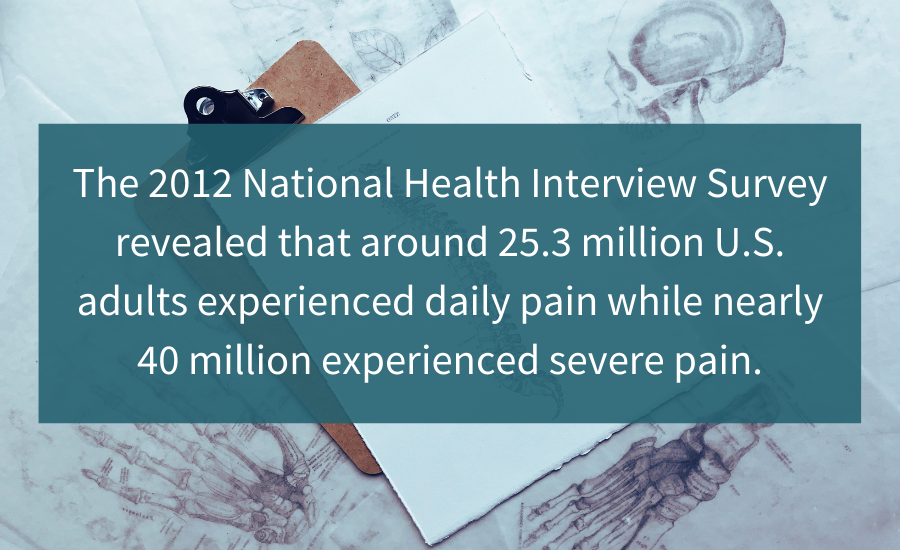 One of the qualifying conditions for medical marijuana in Ohio is “pain that is either chronic or intractable.” The State Medical Board of Ohio further added arthritis, chronic migraines and complex regional pain syndrome to the list in February 2021 as it considered them covered by an existing condition qualifying for medical marijuana in Ohio, namely intractable or chronic pain.
One of the qualifying conditions for medical marijuana in Ohio is “pain that is either chronic or intractable.” The State Medical Board of Ohio further added arthritis, chronic migraines and complex regional pain syndrome to the list in February 2021 as it considered them covered by an existing condition qualifying for medical marijuana in Ohio, namely intractable or chronic pain.
About Chronic Pain
The CDC reports that one in five Americans experiences chronic pain.
What Is Pain?
Pain is an unpleasant sensation like an ache, burn, sting, prick or tingle the nervous system produces as a signal that something in the body may be wrong. It may be dull or sharp and it may be confined to a specific area or pervasive throughout the body.
There are two types of pain: acute and chronic. Acute pain signals a potential injury or medical emergency that must be attended to immediately. Chronic pain can be the result of such an injury or emergency, but it also may not be, and it endures even after its initial trigger.
What Is Chronic Pain?
Chronic pain is any pain lasting longer than what’s medically considered “normal healing” or approximately three to six months. A common and prevalent problem, the 2012 National Health Interview Survey revealed that around 25.3 million U.S. adults experienced daily pain while nearly 40 million experienced severe pain. What’s more, compared with people who experienced less severe pain, those with more severe pain:
- Had poorer health overall
- Utilized more health care services
- Experienced greater disability
Causes of Chronic Pain
Chronic pain can result from an underlying health condition or disease or its cause can be unknown. The most common forms of chronic pain are osteoarthritis and low-back pain. Other common forms include:
- Carpal tunnel syndrome
- Fibromyalgia
- Migraine headaches
- Rheumatoid arthritis
Chronic pain can also be the result of an injury, surgery or other medical treatment, inflammation or a nervous system problem. Such pain can negatively impact the sufferer’s quality of life and ability to be productive. Often accompanying chronic pain may be:
- Depression and/or anxiety
- Disturbed sleep
- Trouble with movement
Chronic pain generally tends to increase as a person gets older and has been found more prevalent in veterans than non-veterans.
 Medical Marijuana for Chronic Pain
Medical Marijuana for Chronic Pain
A multifaceted condition, chronic pain can induce mental and emotional stress on the body as well as physical stress. This requires a multifaceted treatment approach that includes non-pharmacological measures like the use of medical marijuana.
Research on Medical Marijuana for Chronic Pain
The history of the use of medical marijuana to treat chronic pain dates back to more than 5,000 years ago when Chinese physicians used medical marijuana to treat pain associated with a variety of conditions including:
- Childbirth
- Malaria
- Rheumatism
- Constipation
According to the U.S. Centers for Disease Control and Prevention (CDC,) the National Academies of Sciences, Engineering, and Medicine also found medical marijuana beneficial in treating neuropathic pain, or chronic pain resulting from nerve damage.
Further scientific studies have verified the potential efficacy of medical marijuana to treat chronic pain and relieve and reduce its symptoms. As a result, the U.S. Pharmacopeia now reports that medical marijuana has been widely used to treat chronic pain since the 19th and 20th centuries.
Medical Marijuana vs. Opioids for Chronic Pain
Opioids are the most commonly prescribed class of medications to treat chronic pain. While found effective, they also come with tremendous health and safety risks, including the prevalent risks of overdose and death. In fact, two-thirds of the 70,000 overdose deaths in the U.S. in 2019 were associated with opioid use.
A University of Florida research review on medical marijuana and chronic pain found anecdotal reports suggesting medical marijuana could be an effective alternative to using opioids and other medications with long-term health and safety consequences to treat chronic pain. It also found that any potential adverse effects are generally mild and resolve themselves with no intervention needed.
In recent studies, the use of medical marijuana to treat chronic pain has led to a marked decrease in opioid prescriptions, use and related deaths.
Using mmjcard4less to Get an Ohio Medical Marijuana Card for Chronic Pain
If you experience chronic pain, mmjcard4less.com can help you get your Ohio medical marijuana card without even needing to strain yourself or risk worsening your symptoms by having to leave your home, travel to a doctor’s office, wait around for your turn, undergo a physical examination and travel home. Instead, you can do it all from home using telehealth with just an internet connection and a device for getting online.
To use mmjcard4less to get your chronic pain medical marijuanas Ohio card, simply:
- Sign up at mmjcard4less and provide initial information, like contact information and your qualifying condition, in this case chronic pain.
- Upload proof of ID and any medical records of your chronic pain diagnosis and any previous or current treatment.
- Schedule and attend your telehealth appointment with one of our licensed and Ohio CTR physicians.
- Pay the $99 fee for the doctor’s appointment, or the discounted fee for veterans and indigent individuals.
- Once the Ohio Medical Marijuana Control Program (OMMCP) notifies you that the doctor has submitted your medical marijuana recommendation on your behalf, complete your profile on the Patient Registry and pay the state fee.
- Wait for your digital Ohio MMJ card to arrive via email and, then, use it to procure your medical marijuana and verify your patient status to relevant authorities, like the police.
You can either download and print this card to carry around in your wallet or purse or keep it on your smartphone, tablet or other mobile device to present to dispensary staff to purchase your medical marijuana. You can also show it to law enforcement officers to prove your status as a legal medical marijuana patient in Ohio
